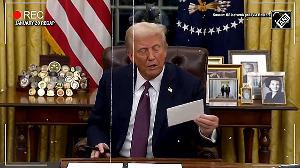The banned Hizb-ut-Tahrir has in the last one decade made three attempts to penetrate the Pakistani military. Its latest bid resulted in the conviction of Brigadier Ali Khan and four other army officers for links with the outfit.
On August 3, a military court convicted Khan and majors Sohail Akbar, Jawad Baseer, Inayat Aziz and Iftikhar for having links with the HuT and gave them prison terms ranging from five years to 18 months.
In 2003, the HuT established links with 13 commandos of the special services group while in 2009, officers up to the rank of lieutenant colonel faced court martial for links with the group.
In 2011, a brigadier faced similar charges, the Dawn reported.
In the incidents of 2009 and 2011, the same HuT members approached army officers. Though army authorities initiated court martial proceedings against the officers, no action was apparently taken against them.
According to documents accessed by Dawn, HuT activists Abdul Qadir and Ahmed, a doctor, were found to have links with Lieutenant Colonel Shahid Bashir in 2009 and Brigadier Khan in 2011.
The documents referred to the same activists to establish the case against these officers. Investigators were unable to find out Ahmed's full name.
The documents showed both activists of the HuT had used the same techniques for establishing links with Bashir and Khan.
They developed relations with the officers through common friends and then used them to approach other army officers.
According to an investigation report prepared by Major Kashif Saleem of the special investigation branch, Khan, with the help of the four majors, was planning to target the civilian and military leadership in an air attack to clear the way for establishing a Caliphate in Pakistan.
The report said HuT activists Abdul Qadir, Ahmed and Rizwan met Khan and persuaded him to hatch this conspiracy.
Khan then tried to cultivate other officers -- including Brigadier Naeem Sadiq, Brigadier Mohammad Amin and Brigadier Aamer Riaz -- for the cause.
The inquiry report against Lieutenant Colonel Bashir stated that Abdul Qadir and Ahmed were the reason for the court martial of Bashir and a lieutenant colonel.
Bashir was charged with acquiring classified information on the location of operational bases for United States drones inside Pakistan, finding out information about an anti-militancy operation in Malakand division and about the deployment of troops in various operational areas.
Bashir was also charged with persuading nine army officers, including Lieutenant Colonel Habibullah, to join his efforts.
Brigadier (retired) Wasaf Khan Niazi, who served in the army's legal wing as judge advocate general in 2009, said he first heard the names of HuT activists Abdul Qadir and Ahmed during the court martial of Bashir.
"After my retirement from the army, when Brigadier Ali Khan and four majors, after their detention, engaged me as defence counsel in the proceedings of field general court martial, I was surprised to notice that the same activists were behind the episode of Brigadier Khan," Niazi said.
"I submitted an application before the presiding officer of the military court and requested him to arrest these perople because these men were damaging the army and had polluted its officers," he added.
The authorities did not accept his request, he claimed.
A retired officer of the JAG branch told Dawn that HuT attempted to infiltrate the army in 2003 and successfully cultivated 13 SSG commandos.
"HuT was not a banned outfit at that time, but when the army authorities came to know about its efforts, then President and military chief General Pervez Musharraf declared it a proscribed organisation in November 2003," the unnamed officer said.
At that time, the army did not launch court martial proceedings against the SSG commandos and instead dealt with them administratively. Their services were terminated, the officer said.
According to him, the investigators failed to bring the HuT activists to book.
Soon after the arrest of Brigadier Khan in July last year, the Inter Services Intelligence and Military Intelligence picked up some hardcore HuT activists from across the country.
These activists -- Imran Yousafzai, Hayan Dawar Khan, Osama Hanif, Abdul Qayyum and Abdul Wahid and Dr Abdul Wajid -- remained missing for some time. Their relatives filed habeas corpus petitions in the Islamabad high court last year for their recovery.
On August 12, the court referred their cases to the Commission of Inquiry on Enforced Disappearances.
The agencies subsequently released Wajid, Hayan, Hanif, Yousafzai, Qayyum and Wahid.









 © 2025
© 2025